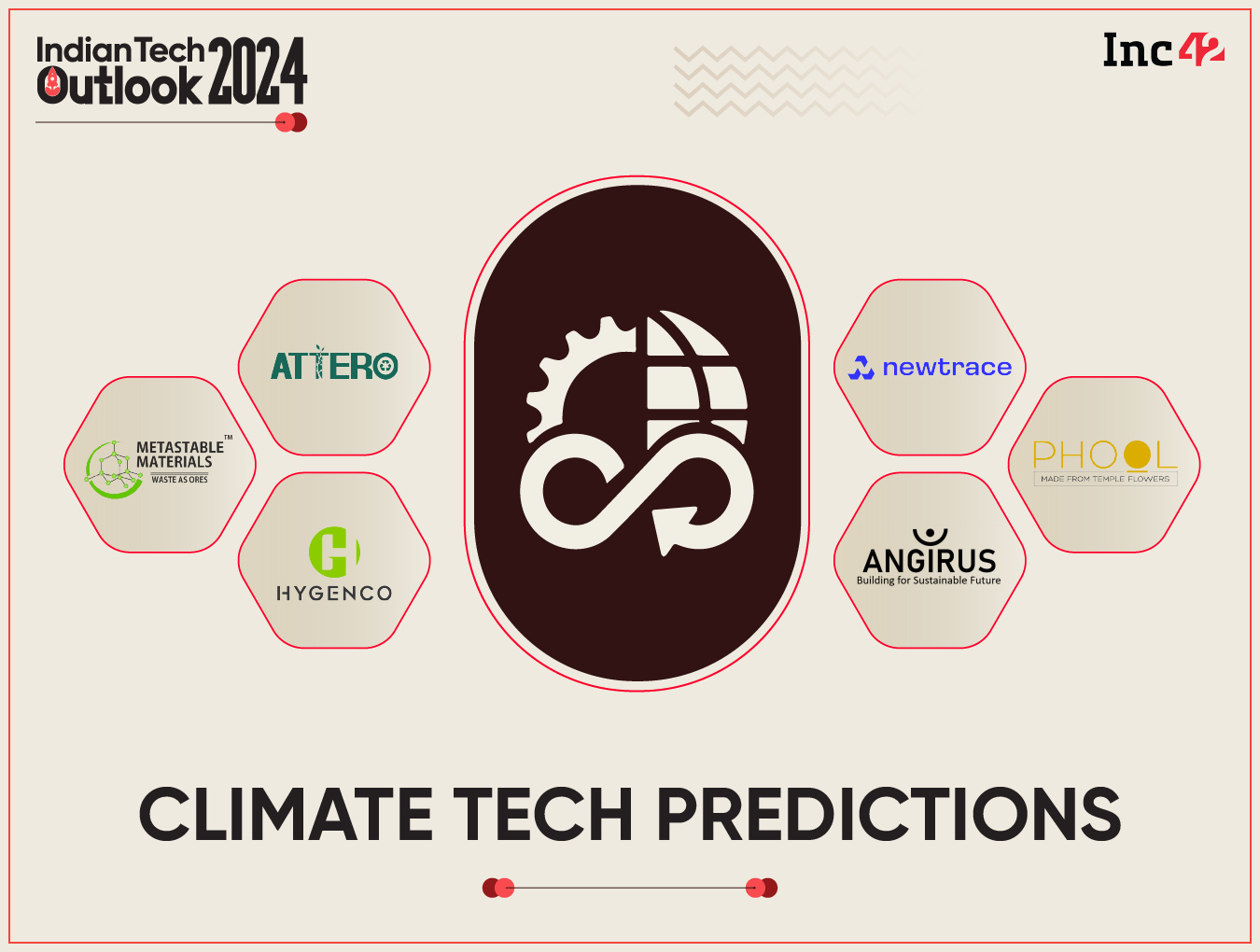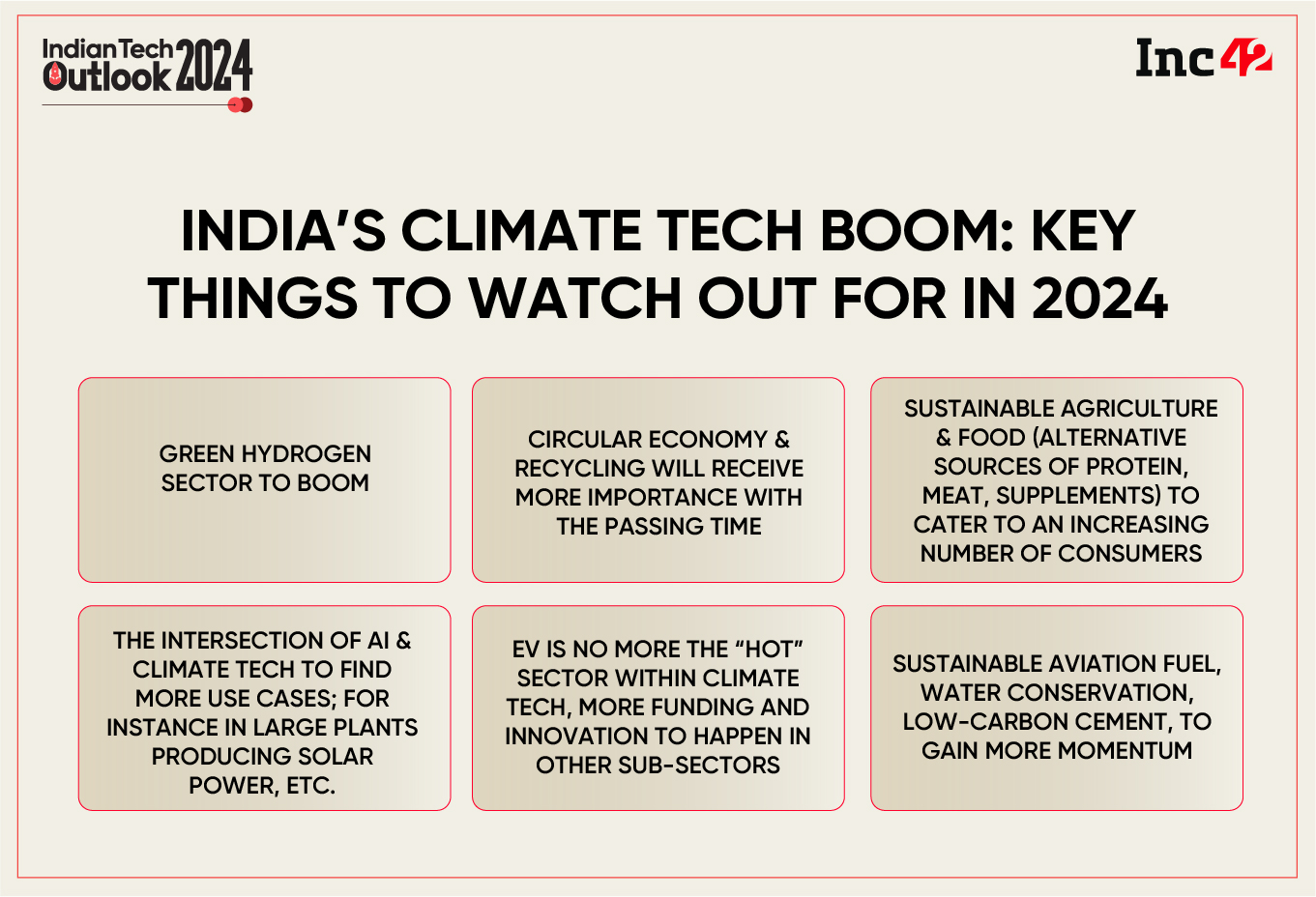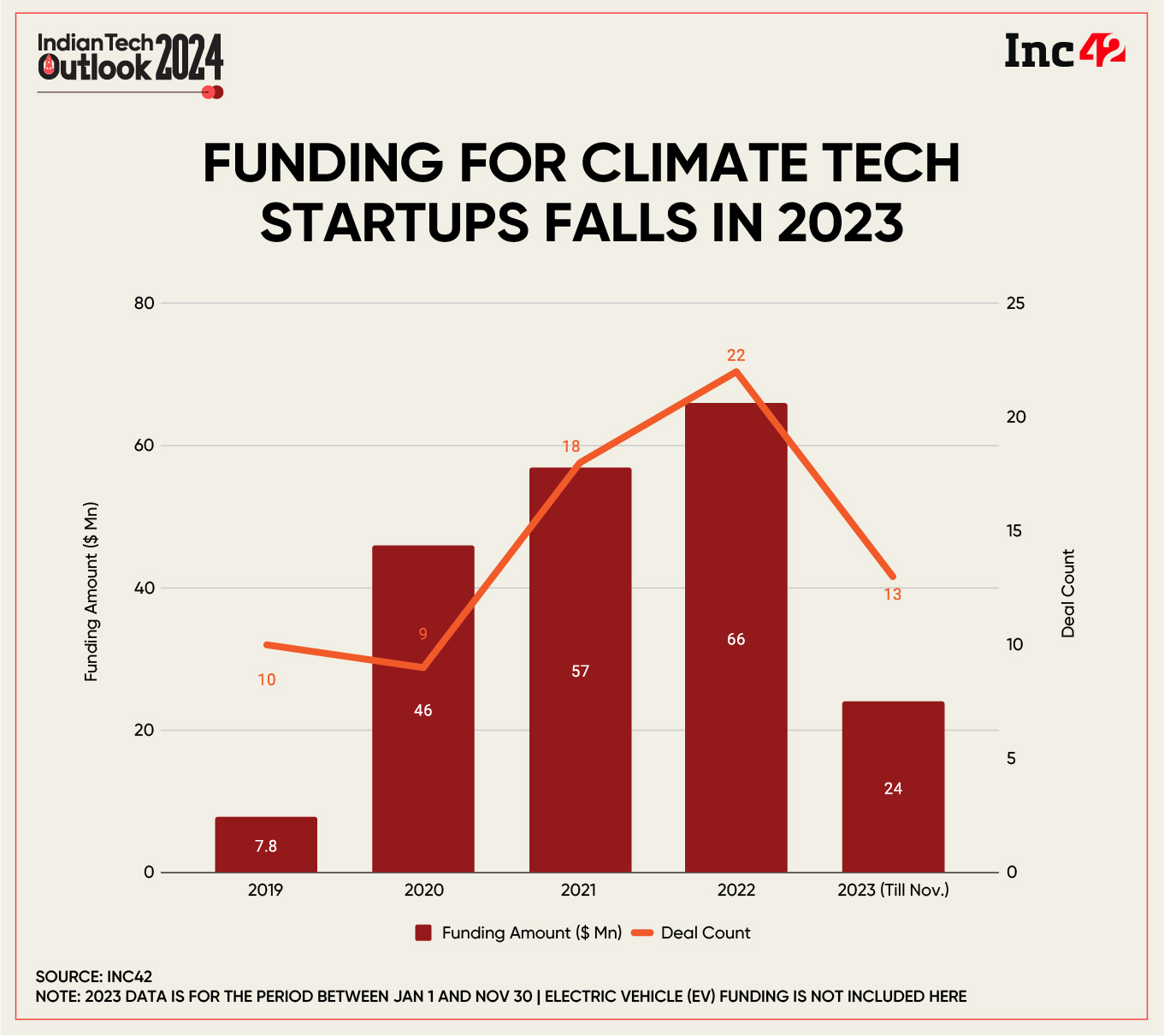6 Climate Tech Predictions For 2024

When we began this year, one of our many predictions for the tech ecosystem included this claim: “Climate Tech’s Moment In The Sun”.
But as it turned out, 2023 was one of the slowest years in the past decade for climate tech funding. Amid the ongoing funding winter and a slowdown in climate tech funding globally, Indian climate tech startup funding fell almost one-third year-on-year (YoY) in 2023.
Inc42 data till November 2023 shows that funding in the Indian climate tech startups has touched $4 Bn since 2014, slightly higher than the $2.7 Bn raised until 2016. It must be noted that the aforementioned funding figures exclude the electric vehicles and e-mobility sector in which the total funding has surpassed $2.6 Bn so far since 2014.
However, as per a PwC report published in October, funding in climate tech has declined globally this year. This is partly because the investor focus has shifted from mobility to areas where business models are yet to be proven.
Despite government policies being floated to support industries such as electric mobility and alternative sources of energy and the emergence of climate-specific private funds, the climate tech sector has yet to reach the level of growth anticipated by everyone.
At the COP26 summit in 2021, India pledged to cut its emissions to net zero by 2070. This target is still not in line with other countries looking to achieve net-zero emissions by 2050. Recently, at the COP28 summit in 2023, India once again said it intends to transition away from fossil fuels.
However, India seems to be adopting a relatively slower path to mitigate any adverse impact on the broader economic growth, as many have argued in the past. But that doesn’t mean government policies are not aligned with net zero goals.
For one, the Ministry of Environment, Forest and Climate Change has set a framework and various incentive schemes for the adoption of renewable energy to augment clean mobility and innovative technologies such as green hydrogen.
Interestingly, in India, mobility continues to be a major focus but as per Inc42’s interaction with multiple investors and industry experts, the interest in the climate tech space has started getting more diverse with more experiments now increasing across these sub-sectors:
- Green hydrogen
- Agrifood and life sciences, which include sustainable agriculture and food production
- Circular economy, which includes recycling
- Sustainable aviation fuel
- Low-carbon cement, water conservation, among others
However, it must be noted that these are still early days. Despite the enthusiasm at the beginning of 2023, this has been a slow year for climate tech, and not just in India.
India is the third largest emitter of greenhouse gases globally. But looking ahead to 2024, can we expect this to change?
Well, industry experts foresee the climate tech landscape to continue its rapid evolution in 2024. They see collaborations between startups, corporations, and governments driving the development of holistic climate solutions.
As part of our Indian Tech Outlook 2024 series, Inc42 talked to several sectoral experts to understand the climate tech trends that will shape the forthcoming year, and here’s what we have learnt.
6 Climate Tech Predictions For 2024
Green Hydrogen Boom Imminent
In January 2023, the Indian government approved the National Green Hydrogen Mission with an initial outlay of INR 19,744 Cr and to develop a green hydrogen production capacity of at least 5 Mn metric tonnes per year along with an associated renewable energy capacity addition of about 125 GW. The aim is to reduce India’s cumulative fossil fuel imports by over INR 1 Lakh Cr.
Sindoor Mittal, vice-chairperson at sustainable energy company Avaada Group, told Inc42 that green hydrogen is going to be the next big thing in the country. Mittal believes that large-scale investments are expected in green hydrogen space, particularly in electrolyser technology.
For one, India aims to become an exporter of green hydrogen while also enabling decarbonisation of its industrial, mobility and energy sectors, reducing dependence on imported fossil fuels and feedstock, creating jobs, and others.
“We are seeing a lot of investments going into electrolyser technology globally and India is showing promising growth. When we were looking at green hydrogen initially, we thought it would be primarily for exports but I think India itself is now focussing on bringing in green hydrogen within its ecosystem,” Mittal added.
The Indian government has rolled out standards for green hydrogen production and this is one area that everyone is watching out for, she added. And that also includes larger conglomerates.
For instance, Essar Group has signed a deal with the Gujarat government to develop a 1 GW green hydrogen project in the state at an estimated investment of INR 30,000 Cr.
The Ministry of New and Renewable Energy (MNRE) has also reportedly proposed an exemption on duties and taxes till 2035 on equipment imports for setting up export-oriented green hydrogen projects.
The government has also initiated discussions for exporting green hydrogen in several European countries.
Riding this wave, several startups have started entering the space. The names include Hygenco, h2e Power Systems, and NewTrace. Last year, Hygenco raised $25 Mn in funding from SBICAP Ventures’ Neev II fund. The 2021-founded NewTrace, which develops batteries and electrolysers for producing green hydrogen, has raised $6.6 Mn so far from the likes of Speciale Invest and Micelio Fund.

Circular Economy To Gain Prominence
Early-stage VC firm Kalaari Capital said in a research report last year that circular economy adoption will help India generate savings of over $624 Bn by 2050 across sectors such as food production and agriculture, construction, and mobility, as well as fashion and metallurgy.
In practice, the circular economy involves reducing waste to a minimum and extending the lifecycle of products by reusing, repairing, refurbishing, recycling, and sharing and leasing existing materials and products
Recycling startups such as Lohum, Attero, and Metastable Materials are gaining more prominence in India, along with VC backing, amid the push for recycling hazardous electronic wastes such as lithium-ion batteries or discarded electronic devices.
Meanwhile, the likes of Phool (eco-friendly incense products), Angirus (recycled construction material), D2C brand Neeman’s (shoes made out of recycled plastic bottles), and Sea6 Energy (fresh seaweed used to make environmentally friendly products) are a few of the many Indian startups that are innovating bio-waste recycling.
Anjali Bansal, founding partner at Avaana Climate and Sustainability Fund believes that capital will flow into innovative projects, specifically in areas like alternative materials and circular economy practices.
She also believes that solutions for agritech, water management, grid-scale energy storage, and large-scale mobility are anticipated to receive more attention and funding.
“These are considered frontier technologies, where significant market mechanisms and substantial financing are yet to fully materialise. However, this situation also presents a unique opportunity for creating innovations and realising substantial returns over the next several years,” Bansal told Inc42.
Role Of Sustainable Agriculture, Food & Life Sciences To Grow
While agritech adoption has grown in spurts among some farmers and food production organisations, sustainable agri and food production practices are the niche areas of development in India.
Green Frontier Capital’s Bhammer believes that the broader agritech sector holds immense promise, with startups pioneering solutions that not only enhance crop yield but also reduce environmental impact.
Similarly, Omnivore’s Mark Kahn is a big proponent of India’s future in the agrifood and life sciences space. While the global agrifood life sciences revolution has the US and China at its centre, Kahn believes India has the right entrepreneurial spirit and investor ecosystem to be a part of the agrifoods and life sciences boom.
Broadly speaking, the agrifoods and life sciences space includes four categories — agricultural biotechnology, novel farming systems, bioenergy and biomaterials, and innovative foods. Omnivore launched the OmniX Bio initiative to back early-stage agrifood life science startups allocating roughly 15% of its $130 Mn corpus or $20 Mn towards this project
Omnivore has invested in companies such as BioPrime, which develops crop inputs to enhance farm yields, as well as Bengaluru-based Loopworm, which enables optimised insect farming for small farmers while producing value-added nutrients and ingredients for B2B customers.
Given that Indian R&D in this regard is still nascent, Kahn added that startups need to start doing the legwork in building the knowledge base to fuel innovation in agrifoods and life sciences and agritech.
Experts also believe that there is an increasing focus on supplements such as alternative sources of meat, protein supplements, and other supplements such as collagen. D2C brands like OZiva and Cureveda are witnessing increasing traction. Besides, the likes of MuscleBlaze and Boldfit have also started diversifying their product offerings with plant-based supplements.
AI To Push Climate Tech Ahead
There is hardly any sector that is not touched by the advancement in AI globally. Interestingly, in climate tech, AI has started playing a crucial role in the advancement of tracking methods for emissions, monitoring them, as well as increasing efficiency, reducing cost, and more.
Avaana’s Bansal said, “Predictive modelling and decision-making are key for planning effective mitigation and adaptation pathways, and AI tools are stepping up to the task. In areas like financing, credit underwriting, and parametric insurance, AI is enhancing decision-making processes and accelerating these critical functions.”
AI is expected to have a notable impact on energy optimisation and industrial mechanisation, where software solutions are boosting overall energy efficiency. Avaada Group, too, is leveraging AI for better efficiency, productivity, and cost.
Currently, the company is running pilots in its solar power plants with the help of AI, which has helped Avaada improve its yield and reduce costs. This increased efficiency is an additional delta in increasing the adoption rate of the technology, Mittal explained.
Will Funding Pick Up For Climate Tech Startups?
Even though funding for climate tech has remained low in the past few years, the pool of investors has grown with time.
However, an analysis by Inc42 showed that across 13 deals climate tech startups raised just $24 Mn this year until November. This is less than half of the tally of $66 Mn in 2022. Climate tech investments from venture capital and private equity fell 40% in 2023 as economic uncertainty and geopolitical conflict dented investor confidence.

Speaking on the evolving funding landscape, Bhammer said that climate tech has fallen in absolute terms but continues to be a larger part of VC and PE funding each year. Investors are displaying a heightened interest in climate tech startups, recognising not only their potential for significant environmental impact but also their capacity to yield impressive returns on invested capital.
Shruthi Cauvery Iyer, the founder and managing partner of CaHa Capital, which launched a climate tech and climate finance-focussed venture studio this year, also believes that the funding landscape in the sector is quite bright.
“We are seeing a lot of interest in climate tech and good evidence for that is the increasing number of climate accelerators, climate funds, and climate venture studios. We see today that a lot of fund managers are thinking about either adding climate as an investment vertical to their thesis or just a purely climate-focussed fund,” Iyer said
Iyer believes that two to three years ago, this discussion around climate was absent. While a lot of credit for this turnaround has to go to the EV sector, she added that clean mobility is no longer the hot sector in climate tech and has been “over-represented”.
“Our internal research indicated that around 1,000 electric mobility startups were incorporated last year. And when a sector becomes that crowded, you can’t say who the winners will be. Raising funding also becomes a problem because everyone approaches investors with the same idea,” Iyer said.
A Shift In Focus From Electric Mobility
Other investors had also previously noted that the focus is indeed shifting from EV OEMs towards sub-segments, including battery technology and recycling.
However, some industry experts believe that large-scale mobility is anticipated to receive more attention and funding since the potential to change the market is immense in such models.
Sustainability is no more just a fad, rather it has undergone a more “real” fundamental shift in both mindset and business strategy both at a national and international level.
“It’s not easy for funds to be specialists in life sciences, pure climate tech, hardware or deeptech and carbon credits. It took a while for VCs to get familiar with other sectors too, so the process has begun and we will see more specialist funds in the coming months,” Kahn told Inc42 earlier this year.
Having said that, 2024 will not be starkly different from 2023 because climate tech models have a longer development cycle and investors need to see precedents and proofs of concepts before deploying large amounts of capital.
“Climate tech is not a vertical play. It’s a horizontal opportunity because it affects everyone and all businesses will need to adopt some form of climate tech to remain sustainable in the future,” according to Siddhanth Jayaram, cofounder of carbon credits startup Climes.
But founders acknowledged that while climate tech is a huge opportunity, the VC world has not woken up to it. VCs have been habituated by the returns cycles in non-climate businesses, but the same realisation involves a longer horizon when it comes to climate tech. Will 2024 change this notion?
The post 6 Climate Tech Predictions For 2024 appeared first on Inc42 Media.
No comments